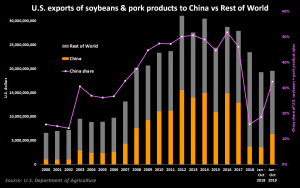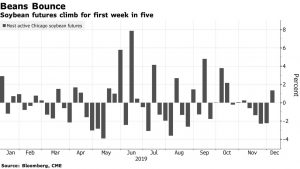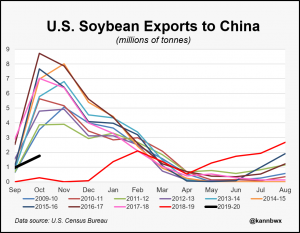President Donald Trump on Friday signed an executive order temporarily expanding the amount of beef the U.S. can import from Argentina, a move the White House says is aimed at…
Farm Purchases Still an Issue in U.S., China Talks; China Waives Tariffs on Some U.S. Soybeans and Pork
Late last week, Wall Street Journal writers Grace Zhu, Eva Dou and Bob Davis reported that, “China’s trade negotiations with the U.S. remain on track, Beijing said, offering official reassurance after tensions flared between the world’s two biggest economies over human-rights issues in China.
“The negotiating teams from both sides have maintained close communications, China’s Commerce Ministry said Thursday, though it didn’t provide details on progress.”
The Journal article pointed out that, “During the past few days, though, officials in the U.S. have become less optimistic about a deal. The two nations remain at odds over the value of U.S. farm goods Beijing would buy, with President Trump looking for $40 billion to $50 billion a year within two years.
“That is an enormous increase from the $8.6 billion last year—and twice as much as China bought from the U.S. before the trade war began in earnest in 2018.”
The Trump administration wants Beijing to publicly state its purchasing plans and not condition them on market circumstances or China’s trade obligations, people familiar with the discussions said. Beijing is reluctant to make that pledge because it might have to divert purchases from other trading partners that are likely to object.
The Journal writers added that, “While the U.S. is willing to skip the next tariff increase, Mr. Trump and U.S. Trade Representative Robert Lighthizer are reluctant to start scrapping tariffs. Their willingness to do so depends largely on how much in farm goods Beijing will buy and how firmly it will commit to the purchases, say the people familiar with the talks.”
Meanwhile, Reuters writers Dominique Patton and Yawen Chen reported last week that, “China on Friday confirmed that it will waive import tariffs for some soybeans and pork shipments from the United States, as the two sides try to thrash out a broader agreement to defuse their protracted trade war.”
The Reuters article explained that, “Importers with duty-free quotas have been required to pay the tariffs and later apply for refunds, a process that traders said caused delays in unloading shipments. Friday’s announcement appeared to remove that step, industry sources said.”

Bloomberg writers Megan Durisin, James Poole, and Michael Hirtzer reported on Friday that, “Soybean futures climbed for the fourth straight day as officials signaled optimism that the U.S. and China will reach a trade deal.”

“January soybeans rose as much as 1.1%, capping the longest streak of gains since September. February lean hog futures jumped as much as 3.7% before erasing those gains, with the biggest U.S. herd since 1943 still anchoring prices,” the Bloomberg writers said.
Also last week, Reuters writers Min Zhang and Dominique Patton reported that, “China boosted its soybean production by 13% in 2019 amid a trade war with No. 2 supplier the United States, official data showed on Friday, helping it record a slight rise in total food crop output.
“Soybean production jumped to 18.1 million tonnes, the National Bureau of Statistics said, with the area devoted to the oilseed rising 11% after Beijing began offering generous subsidies to farmers to grow the beans.”
However, the article noted that, “China brought in 70.69 million tonnes of the oilseed in the first 10 months of the year. It has been increasing shipments from its top supplier Brazil at the expense of U.S. growers.”
More broadly, Reuters columnist Karen Braun indicated on Friday that, “So far, the U.S. 2019-20 soybean shipping season is going much better than last year’s effort thanks to more involvement from China in the U.S. market.
“But China’s interest in the U.S. oilseed is roughly half as strong as it had been in prior years because of the ongoing trade war and reduced domestic demand.”

Ms. Braun stated that, “The United States exported 5.94 million tonnes of soybeans in October, according to data published Thursday by the U.S. Census Bureau. That is the highest monthly volume since December 2017 and is 9% higher than in October 2018.”
Additionally on the ongoing U.S., China trade talks, and farm purchases, Bloomberg’s Brendan Murray and Jonathan Ferro reported on Friday that, “The U.S. and China are trying to agree on the amount of American agriculture products that Beijing is willing to purchase, said White House economic adviser Larry Kudlow, who declined to repeat President Donald Trump’s advice to farmers two months ago to buy more tractors and land.
“The two sides are in ‘almost around-the-clock’ negotiations on some of the most ‘delicate’ matters, including a dollar amount of commodity purchases, he said Friday in an interview with Bloomberg Television.”
There's no single make or break condition on trade talks with China, White House adviser Larry Kudlow tells @ferrotv https://t.co/PBVzndGOFn pic.twitter.com/bRmfrCvgf7
— Bloomberg TV (@BloombergTV) December 6, 2019
The Bloomberg article explained that, “Eight weeks ago, Trump announced that a phase-one agreement had been reached between Washington and Beijing, subject to getting it down on paper in a process that might take three to five weeks. According to Trump at the time, China agreed to $40 billion to $50 billion in U.S. agricultural goods annually — a quantity so large, he indicated, that farmers should invest in more equipment and land.
“Asked today about the president’s advice, Kudlow stopped short of repeating it.
“‘I don’t want to tell the farmers what they should and should not do,’ he said. ‘I’m not going to give them free advice on how they run their businesses.'”
Republican Sen. Rick Scott tells @DavidWestin he doesn't see a U.S.-China trade deal happening and that the U.S. is "heading towards a cold war" with Beijing. https://t.co/jvGay0cyyf pic.twitter.com/tqx6mW20t7
— Bloomberg TV (@BloombergTV) December 7, 2019
And Yun Li reported on Friday at CNBC Online that, “Larry Kudlow, director of the White House National Economic Council, said the U.S. and China are ‘close’ to a trade deal but that the administration was prepared to walk away if it did not get the terms it wanted.
Top 10 U.S. #export markets for #soybeans, by volume https://t.co/oAGtDh70fa @USDA_ERS pic.twitter.com/aXxXh50PG1
— Farm Policy (@FarmPolicy) December 6, 2019
“‘The president has said many times if the deal is no good, if the assurances with respect to preventing future thefts, if the enforcement procedure is no good he has said we will not go for it. We will walk away,’ Kudlow said on CNBC’s ‘Squawk on the Street’ on Friday. ‘The president has said that if we cannot get the enforcement and the assurances, then we will not go forward.'”
Former U.S. Ambassador to China Max Baucus tells @DavidWestin that "we're getting closer to a deal" with Beijing https://t.co/rUYgUtj7vY pic.twitter.com/i8jBuh020k
— Bloomberg TV (@BloombergTV) December 6, 2019
The CNBC item added that, “The two countries are in talks to finalize a so-called phase one trade deal as 15% tariffs on $165 billion in Chinese imports are set to kick in Dec. 15. Kudlow said the two sides are moving near a deal.
“‘The deal is close. It’s probably even closer than in mid-November,’ Kudlow said. ‘The reality is constructive talks, almost daily talks. We are in fact close. … There’s no arbitrary deadlines, but the fact remains Dec. 15 is a very important date with respect to a no-go or go on tariffs.'”
Additionally, on Monday, Reuters News reported that, “China said on Monday that it hoped to make a trade deal with the United States as soon as possible, amid intense discussions before fresh U.S. tariffs on Chinese imports are due to kick in at the end of the week.
“Beijing hopes it can reach a trade agreement with the United States that satisfies both sides, Assistant Commerce Minister Ren Hongbin told reporters on Monday.”





